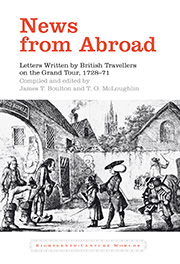Book contents
- Frontmatter
- Contents
- Preface
- Illustrations
- Acknowledgements
- ‘Old Style’ and ‘New Style’ Dating
- Map
- Introduction: The Grand Tour
- The Tourists and Their Letters
- George Lyttelton (1709–73): Letters (1728–30)
- Joseph Spence (1699–1768): Letters (1730–3)
- James Boswell (1740–95): Letters (1764–6)
- James Barry (1741–1806): Letters (1765–71)
- Caroline Lennox (1723–74): Letters (1766–7)
- Appendix A The Hazards of Collecting Art on the Grand Tour
- Appendix B Advice to Travellers on the Grand Tour
- Bibliography
- Index
Introduction: The Grand Tour
- Frontmatter
- Contents
- Preface
- Illustrations
- Acknowledgements
- ‘Old Style’ and ‘New Style’ Dating
- Map
- Introduction: The Grand Tour
- The Tourists and Their Letters
- George Lyttelton (1709–73): Letters (1728–30)
- Joseph Spence (1699–1768): Letters (1730–3)
- James Boswell (1740–95): Letters (1764–6)
- James Barry (1741–1806): Letters (1765–71)
- Caroline Lennox (1723–74): Letters (1766–7)
- Appendix A The Hazards of Collecting Art on the Grand Tour
- Appendix B Advice to Travellers on the Grand Tour
- Bibliography
- Index
Summary
THE GRAND TOUR has in recent decades become the focus of much s cholarly research and comment, which understandably treats it as a striking phenomenon, a significant cultural feature of eighteenth-century life. Scholars look, as it were, from the outside in. What this volume offers is a view from the inside. The travellers speak for themselves: each responded differently, was curious about different things, enjoyed different pleasures. The Tour emerges as a vast panorama of opportunities and experiences, far wider than any individual could take in. The point is all the more evident from the fact that none of these correspondents was writing with a view to publishing his or her letters; these have an immediacy unhampered or refined by thoughts of an eventual public readership. Spence did think of publishing, but nothing came of the idea. Others followed the fashion of disseminating their experiences to the general public. To publish one's letters meant shaping them as a corpus, endowing seemingly impromptu and personal letters with a kind of homogeneity, and providing a discursive unity. Such a volume could then be read and criticized as a crafted response to the Tour. For example William Beckford, who published his Tour letters as Dreams, Waking Thoughts and Incidents (1783), is said by one critic to illustrate ‘the movement from North to South that the Tour entails’. The letters in this collection are strictly ‘familiar’ and informal: that is part of their distinctive appeal.
- Type
- Chapter
- Information
- News from AbroadLetters Written by British Travellers on the Grand Tour, 1728–71, pp. 1 - 3Publisher: Liverpool University PressPrint publication year: 2012



